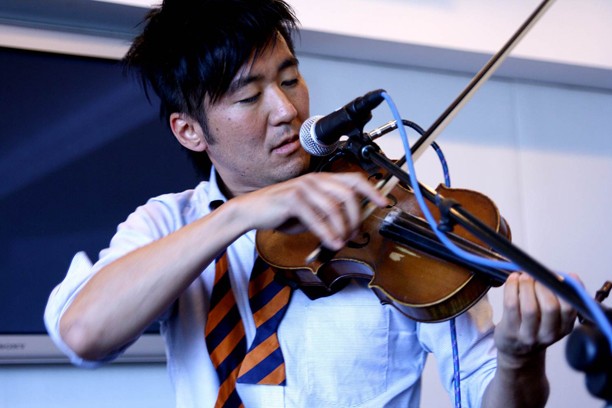Sometimes sacrifice and solitude are requirements for getting what you want. Though it comes at a cost, like most other aspects of creative efforts, the payout is worth the input. For K. Ishibashi, the sole force behind the avant-pop act, Kishi Bashi, this meant stints with Regina Spektor and Of Montreal as a hired gun, relying on his classical training on violin to put food on the table.
And for his most recent effort, the freewheeling and multicultural 151a, Ishibashi took that sacrifice one step further. Abandoning the financial pressures of New York City, the Japanese-American multi-instrumentalist settled in Virginia to build a studio in his parents’ home, taking six months off from city life to craft the album he’d been biding his time to make.
“[The move] kind of allowed me to really take some risks, and I’m glad I did because the album is doing well,” Ishibashi said.
For an effort that’s as eclectic as 151a is, from its Japanese-influenced title, a syllogistic phrase translating to “one time, one place,” to Ishibashi’s instrumentation, the album’s progress has been stellar.
Garnering accolades from Spin Magazine, Stereogum and even becoming something of a darling of NPR, the success of the album has made Ishibashi his own employer — something he’d strived for his entire career.
“I’m in a position now where I don’t have to [be a gun-for-hire],” Ishibashi added. “I look forward to collaborating with artists, but I don’t think I could, or I won’t, work for anyone anymore.”
That artistic freedom is well deserved. Listen to 151a in its entirety and you’ll be rewarded with the most uplifting work this side of an Edward Sharpe release. Though for how fluid and linear the album is, Ishibashi’s process isn’t the typical de rigueur of a classically trained musician.
“I’m not a purist in any form about the creative process, so it kind of comes as it is,” Ishibashi said. “I take the approach of making a lot of music and then hopefully condense it, with the hope of conquering a good portion of it, so I can have a good amount of core material.”
While the album only clocks in at nine songs, there’s no filler on 151a. Rather, the songs are imbued with bits of Ishibashi’s heritage, employing Japanese hooks on songs like “Chester’s Burst Over The Hamptons” and “Bright Whites.” Though it seems like a direct nod to his background, Ishibashi’s employment of Japanese lyricism acted more as a tool to begin with.
“I was looking for a way to create a different vocal instrument. When I was diving into the vocal technique, I was trying to find an alien instrument,” he said. “Japanese is actually really rhythmic, so it kind of works perfectly.”
By tying both cultural, lyrical and rhythmic elements into the album, it’s safe to say that Ishibashi has created something of a benchmark. Nothing about his approach, from composition to production, feels like something done on a shoestring budget.
And while 151a was written under alternative circumstances, it’s simultaneously the end to this chapter of Ishibashi’s career and the beginning of the next path he’ll take.
“_151a_ is my reaction to everything I’ve been doing all my life,” he said. “I had always been a violin for hire, or a composer for hire, scoring strings, and I never really did it for myself. I decided that this thing that I’m actually good at, I’ll really exploit it and work for myself.”









